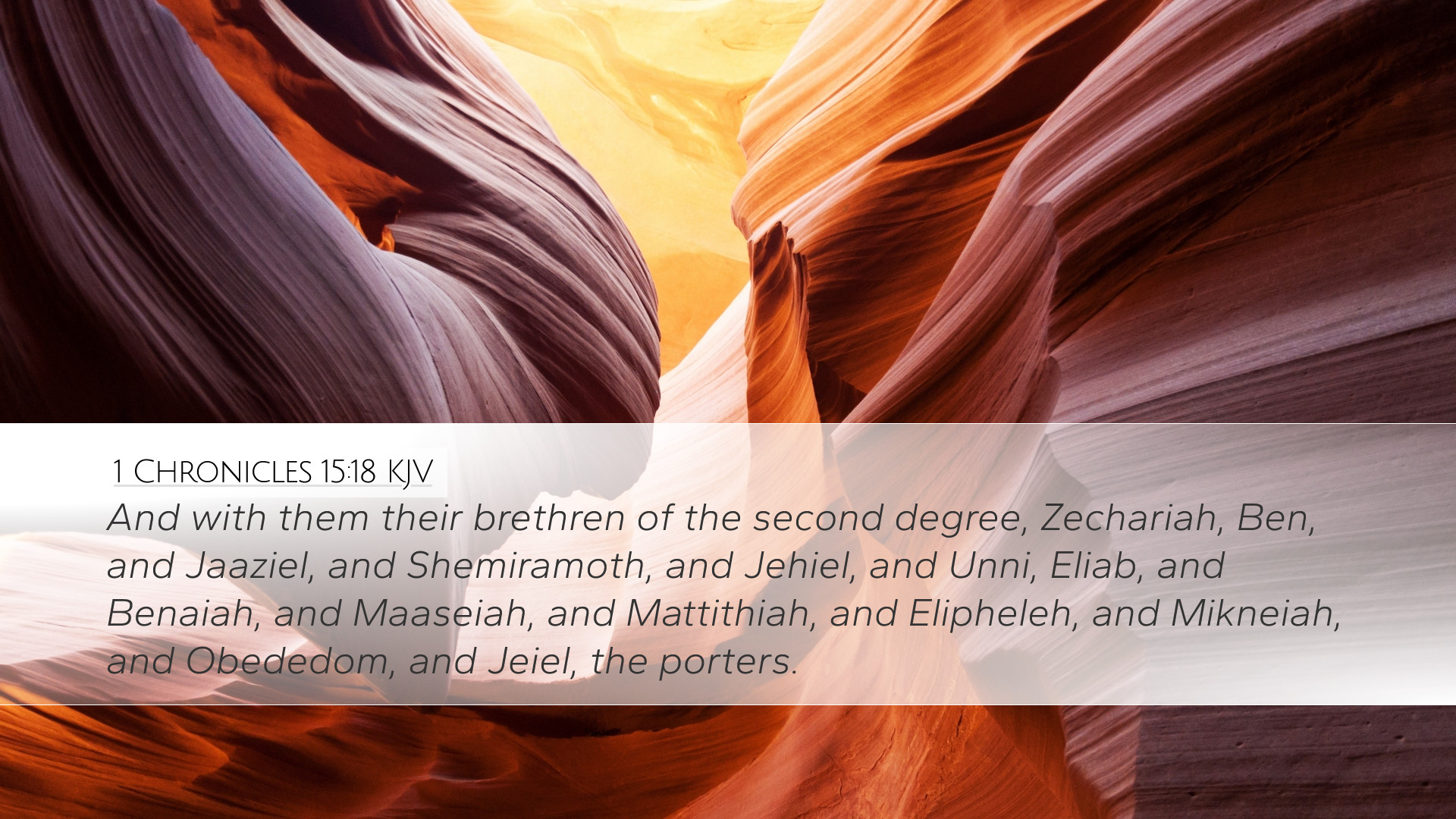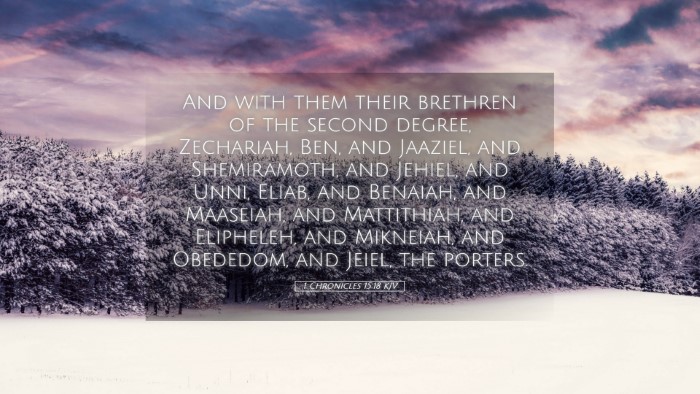Commentary on 1 Chronicles 15:18
Introduction
1 Chronicles 15:18 captures a significant moment in the restoration of proper worship in Israel, particularly through the assembly of the Levites and the organization of liturgical practices surrounding the Ark of the Covenant. This verse highlights the importance of leadership and order in approaching God, ensuring reverence for His presence. In this commentary, we will draw insights from public domain commentators such as Matthew Henry, Albert Barnes, and Adam Clarke.
Verse Context
To fully grasp the significance of 1 Chronicles 15:18, it is essential to understand its context within the narrative of 1 Chronicles. This book emphasizes the importance of worship and the central role of the Temple. King David is seen here as re-establishing the worship practices that had become corrupted. The verse occurs in the midst of preparations for bringing the Ark of the Covenant to Jerusalem, which symbolizes God's presence among His people.
Text of 1 Chronicles 15:18
"And with them their brethren of the second degree: Zechariah, Ben, and Jaaziel, and Shemiramoth, and Jehiel, and Unni, and Eliab, and Maaseiah, and Benaiah, and the sons of Merari; [1 Chronicles 15:18]"
Key Themes and Insights
1. The Role of Proper Leadership
According to Matthew Henry, leadership in worship is paramount. The mention of leaders such as Zechariah, Ben, Jaaziel, and others illustrates the necessity of organizing those who lead in worship. For Henry, this reflects God's order in church governance and the importance of sound leadership that is attentive to divine protocols.
2. The Importance of the Levites
Albert Barnes highlights the distinct roles assigned to the Levites, emphasizing their consecrated status and commitment to service. The verse showcases the Levites as critical mediators between God and the people, entrusted with the sanctified task of carrying the Ark. Barnes notes that the meticulous arrangement of duties signifies the seriousness with which these holy tasks were approached.
3. Unity in Worship
Adam Clarke draws attention to the unity displayed among the Levites mentioned in the verse. This unity is crucial for effective worship and collective experience of God's presence. Clarke elaborates that the assembly of brethren ensures that worship is not a solo endeavor but a communal effort, encouraging teamwork in spiritual activities and fostering unity among the people of God.
4. The Significance of the Second Degree
The phrase "of the second degree" as noted by Henry may imply a broader category of service beyond the immediate leaders. This inclusion points towards a tiered approach to leadership where various levels of engagement exist in worship. The acknowledgment of those in subordinate positions underscores the value of every participant in contributing to the sacred task at hand.
5. Preparedness in Worship
Clarke emphasizes the importance of preparedness and the reverence associated with bearing the Ark. He comments that the Levites were duty-bound to uphold a high standard as they approached the Ark, which serves as a model for contemporary worship practices. Leaders and worshippers alike must come prepared and with hearts attuned to God's holiness.
Application for Modern Readers
The insights derived from 1 Chronicles 15:18 can significantly inform contemporary church practices, especially for pastors, theologians, and scholars. Here are some critical applications:
- Cultivating effective leadership: It is essential to train and empower leaders within the church to guide worship effectively.
- Valuing every member: Just as the Levites had distinct roles, all members of the congregation are called to contribute to the ministry of the church.
- Promoting unity: Encouraging collaboration and unity among congregants fosters a more profound worship experience.
- Prioritizing reverence: Worship must be approached with a spirit of reverence, recognizing the holiness of God’s presence.
Conclusion
In summary, 1 Chronicles 15:18 serves as a rich source of wisdom regarding worship leadership, communal responsibility, and the sanctity of God’s presence. Through the lens of the commentaries by Matthew Henry, Albert Barnes, and Adam Clarke, we glean a deeper understanding of the biblical texts. This passage not only speaks to the historical context but also challenges modern readers to reconsider how they approach worship and communal gatherings in today’s church.


